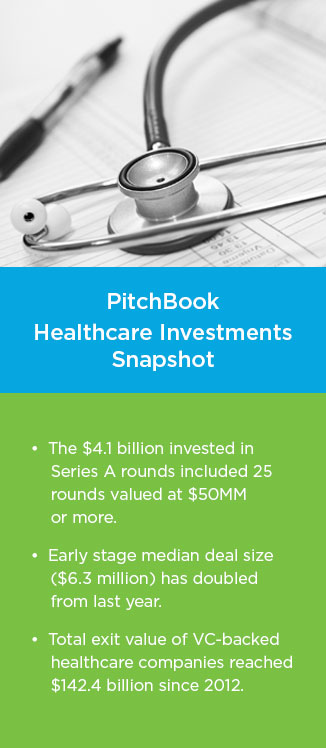Healthcare Companies Secure Record $4.1 Billion in Series A Rounds: The View from Our Backyard
There’s good news in healthcare for investors and entrepreneurs.
 PitchBook reports that in 2015, VCs have invested nearly $21 billion in capital. That’s $2 billion more than in all of 2014.
PitchBook reports that in 2015, VCs have invested nearly $21 billion in capital. That’s $2 billion more than in all of 2014.
For the first time in more than 10 years, healthcare accounted for more VC capital exited (47%) than IT (24%) did.
Viewed from any direction, there’s enormous change and opportunity occurring in the healthcare industry driven by regulation (Affordable Care Act full implementation), technology, culture and fashion (wearables), and the intersection of these (corporate and personal wellness). It’s the perfect storm for entrepreneurs with breakthrough ideas and the ability to execute to transform an industry
Rev1 portfolio companies are at the forefront of healthcare innovation.
The Rev1 market validation model of entrepreneurship is a great accelerator for healthcare startups.
Consider three portfolio companies—Ardina, Updox, and TrueDOK—startups that are delivering solutions that tackle three of the top 10 healthcare trends and challenges for 2016 as reported by PricewaterhouseCoopers*.
-
High deductible plans with more out-of-pocket expenses
Consumers are increasingly motivated to manage their medical spending. Ardina, a healthcare membership company, is here to help.
Ardina provides healthcare benefits that people can afford to use, helping families and individuals with high annual deductibles stretch their out-of-pocket healthcare dollars. Ardina also offers 24/7 access to tele-doctors and online counselors, pharmacists, dietitians.
Membership ($10-$20 per month) covers an entire family, giving access to doctors, nurses, pharmacists, and more for $0 copay and without submitting claims, as well as to discounts on out-of-pocket healthcare expenses such as prescriptions, dental care, or glasses. Ardina is not insurance or intended to replace insurance.
-
Increased financial transparency
Fees for medical visits and procedures aren’t likely to remain “behind the curtain”.
Healthcare is possibly the only industry in the country where consumers often don’t know what they will pay for the services they use, and health care providers often don’t know who will be paying for the services they deliver. However, financial transparency is evolving and likely to be driven further by large deductibles.
trueDOK provides a cloud-based healthcare platform, which automates the submission, tracking, and ultimate determination of procedures and prior authorizations required by insurance plans from one easy-to-use interface.
With trueDOK’s HIPPA-compliant software as a service (SaaS), healthcare providers and patients will know (before service is delivered) whether the payer will be the insurance company, the patient, or both. Once an appointment is scheduled, with just a few clicks, trueDOK providers will be able to calculate and electronically share with a patient his or her financial responsibility prior to delivering services.
-
Pressure on physician practices to improve patient relationships while increasing efficiency and reducing costs
Updox, the industry leader for physician connectivity and CRM solutions, delivers a spectrum of cloud-based services that help physicians improve patient care relationships and outcomes while achieving a measurable impact on the medical practice’s bottom line.
Updox was founded because independent physicians and practices need a secure way to communicate with other physicians and patients in a way that helps coordinate care and better manage relationships.
Today, with thirty-plus employees, 130,000 users, and 25 million patients, Updox is changing the way that healthcare connects. The firm debuted at #524 on the 2015 Inc. 5000. Updox is in the top 10 percent of the fastest growing private companies in the US.
From electronic health records (EHR) to patient health data to gaining efficiencies (while ensuring cyber security) to reduce cost and improve care, patients and physicians seek connected access to information. More than 80 percent of physicians say that mobile access to medical information helps coordinate patient care.
Updox’s HIPPA-compliant system makes record-sharing and interoperability work with Direct Secure Messaging. “Now that all this information is flowing back and forth, physicians can better engage patients in making smart decisions for that patient’s own health,” Morgan said. “We have what the industry needs and have become the central network for communicating all this information.”
Healthcare headlights are bright for investors
Increasing merger and acquisition activity in healthcare is a boon to the sector. Through third quarter, PitchBook reports 1,305 deals worth an aggregate $400 billion plus have closed.
PitchBook says that relatively quick investment-to-exit healthcare deals produced great returns and freed up “dry powder” for investments in new companies instead of follow-on rounds.

